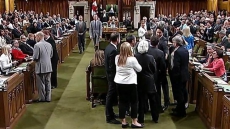OTTAWA — The lyrics to O Canada will be a hot topic in Ottawa on Tuesday, even though the July 1 fireworks are still a month away.
The House of Commons is debating an effort by dying Liberal Mauril Belanger to render the national anthem gender-neutral, by replacing the line in the English version "in all thy sons command" with "in all of us command."
Belanger, a long-time Ottawa MP, has seen his health deteriorate since he learned last fall he has an incurable and fatal neurogenerative disease called amyotrophic lateral sclerosis — also known as ALS, or Lou Gehrig's disease.
He introduced his private member's bill in January using a voice generator that converts text into computerized speech, the first time one had been used in the Commons.
The Conservatives thwarted an attempt to pass the bill quickly in early May, which had Liberals accusing their rivals of taking away the chance for Belanger to see his bill pass while he is still able to enjoy it.
Conservative MP Erin O'Toole said he sympathizes with Belanger's situation, but is speaking against the bill because he does not believe Canada should change important parts of its heritage, even when they have fallen behind the times.
"He's a friend and someone I admire greatly and seeing him struggle with ALS is tragic and a lot of us want him to be able to fulfil his duties as an MP, so we all want that go forward, but we also have to look at the substance of the bill," O'Toole said Monday.

O'Toole, who said he joined the military at 18 years old, said the institutions, symbols and heraldry of Canada are very important to him and should not be changed lightly.
"I think it's better for us to show the teaching issue here, on how the anthem is frozen in time and how we can learn from that, to show how far we've come," O'Toole said.
But Belanger and others who believe the anthem should be changed have argued the amendment would in part restore the original English lyrics of O Canada, which referred to "thou dost in us command".
The wording was changed to "all thy sons" in 1913, which Belanger said many believe was done in response to events leading up to World War I.
"On the eve of the 150th anniversary of our federation, it is important that one of our most recognized and appreciated national symbols reflect the progress made by our country in terms of gender equality," Belanger told the Commons on May 6.
"This progress was slow and hard-won at times and it marked our country's history. It should be celebrated in our national anthem."
The previous Conservative government had proposed a gender-neutral anthem in the 2010 throne speech, but quickly backtracked in the face of strong public opposition.




